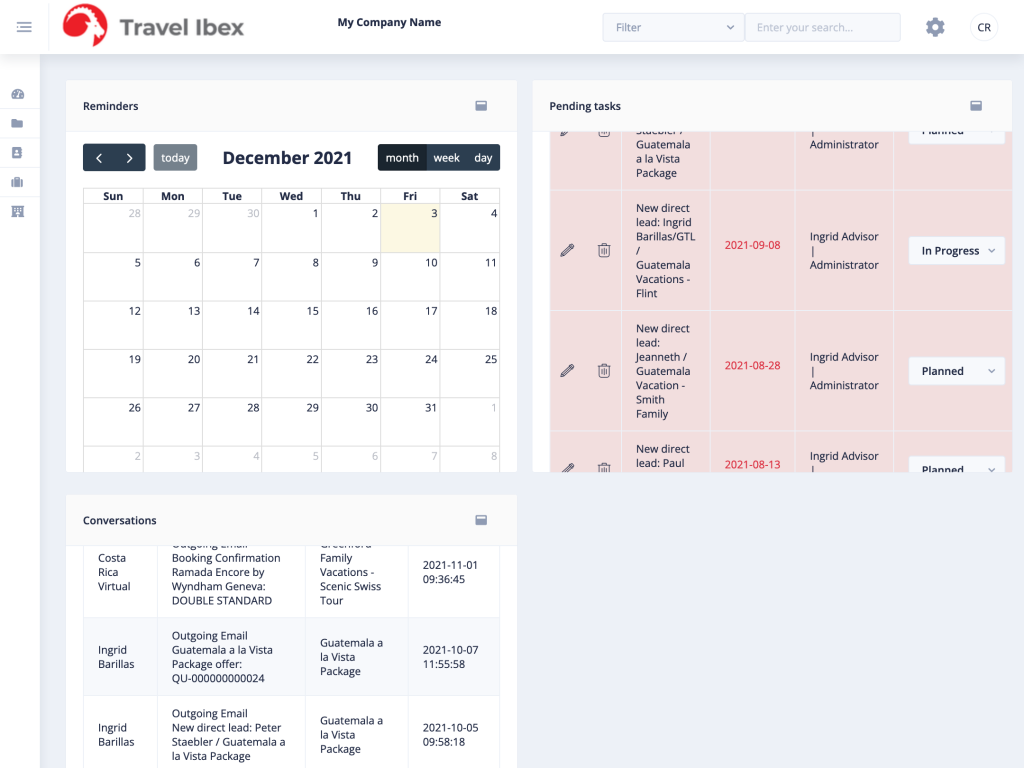Travel Ibex is the CRM for Travel Industry
CRM – Customer Relationship Management – software can be especially beneficial for companies in the travel industry, where there are often many interactions with clients and a need to manage a large amount of data. With a CRM system in place, travel companies can better organize customer information, track bookings and reservations, and even send targeted marketing messages to clients based on their past interactions with the company. This can ultimately lead to better customer satisfaction and retention, as well as increased sales and revenue.

Benefits of a CRM For Travel Agents
Save Time
CRM software can save time by providing a centralized database that houses all customer-related information, such as contact information, communication history, and purchase history. This can eliminate the need for employees to search through multiple systems or files to find the information they need, which can be a time-consuming and frustrating process.
Remember, saving time is not about doing everything faster. It’s about working smarter.
Increase Efficiency
With a CRM tool, customer support teams can easily access all the relevant information about a customer in one place, such as their contact details, order history, and previous interactions with the company. This allows them to provide faster and more personalized support, which can lead to increased customer satisfaction and loyalty.
Optimize to Build Business Strategy
A CRM system can also help companies to improve customer relationships by providing a centralized platform for managing customer interactions and tracking customer behavior. This can help advisors to provide better customer service, tailor their offerings to meet customer needs.
CRM is a crucial tool in the tourism industry as it helps businesses optimize their operations and build effective business strategies.
A CRM system can help businesses in the tourism industry optimize their operations and build effective business strategies by providing insights into customer behavior and preferences, enabling personalized communication and offers, identifying cross-selling and upselling opportunities, improving customer service, analyzing data to inform decision-making, and increasing the likelihood of repeat business.
Integrate With Other Software
If you do not yet have a CRM, it’s likely that you are using some sort of software– or more than one software application! – to help run your business. That may also be what is holding you back from making the leap and getting a CRM for your team. Luckily, CRM software can actually integrate with most existing programs or software that you are using. That way, all of the information you already have stored in these can be accessed by your CRM. Additionally, you can create documents or complete other tasks in other software, and then access it through your CRM when it is needed. This is a great example of your CRM acting as your business’s central hub or touchpoint for information.
Increase Customer Satisfaction
Of course, in any business, you need to keep your customers happy! After all, without customers, you don’t have much of a business. A CRM is designed to increase your customer satisfaction rate, and in turn, increase your customer relationships. That’s why CRM stands for customer relationship management.
A CRM can help you to familiarize yourself with your customers and their needs so that you can provide suitable solutions. It can also help you to provide better service by increasing your efficiency and accuracy, which gets them answers to their questions quicker, for instance.
The software will store their details, histories, and preferences so that the service you provide is more personalized.
Overhaul Your Client Experience
One of the big draws of a CRM is the ability to closely track your customer relationships and your clients’ journeys through the sales funnel. Another feature that has to do with the client experience is the overhaul of the client experience– you can model your client experience off of your CRM database.
Artificial and Business Intelligence enter here and help to reassess and then customize your business strategies. This can help you to stand out among the competition by offering services and packages that align well with emerging market trends.
A CRM can help you to come up with angles that you may not have thought of on your own.
Expand Your Business
Last, but certainly not least, a CRM can help you to expand your tourism business! You will be able to increase your efficiency in many areas, which in turn gives you more bandwidth to help more clients and therefore expand.

All of this centrally stored data can also help to optimize your business and marketing strategies, which will assist in reaching more leads.
Do not delay – put your agency ahead of the competition by providing your advisors with the information they need to address customer inquiries and complaints quickly and effectively!
Recent Posts
- What Is an Ibex — and Why It Represents the Strength of Travel Ibex
- Important Notice: Fraudulent Website Alert
- Unlocking Success: The Ultimate Decision-Making Tool for Travel Agents
- Start creating your multi-destination vacation packages today!
- WooCommerce Now Available for Travel Ibex!
- Last-minute changes
- Automation Bring Numerous Benefits To Tour Operators
- Travel Ibex Template New Features
- Itinerary Builder: Enhances the Overall Travel Experience, Making it a Valuable Asset for Travel Agencies
- Travel Ibex is the CRM for Travel Industry

